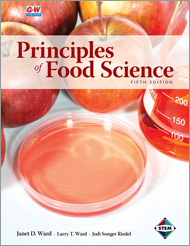Principles of Food Science, 5th Edition
By: Janet D. Ward, Larry Ward, and Jodi Songer RiedelCopyright: 2022
Subject: Food / Nutrition
Grade Level: 9-14
- Principles of Food Science demonstrates how the laws of science are at work in producing, processing, preparing, preserving, and metabolizing food. Students learn how cooking, health, and storage tips connect science basics to daily food encounters. The text covers the basic laws of chemistry, microbiology, and physics as they relate to food components and complex food systems. Students learn scientific facts and principles that they can apply to a future food science career and to more-creative, nutritious home cooking. The requirements and opportunities for obtaining a food science career are explored as well as the impact of this career path on local, national, and global economies.
- A new chapter addresses biotechnology and its impact on the food supply.
- New “Farm Futures” features in every chapter emphasize the connection to the Agriculture, Food, and Natural Resources career cluster.
- The value of different types of evaluations—scientific vs. sensory—are examined, with applications to school lab experiments and commercial food product development.
- Products & Prices College & Career
- Table of Contents
- The Science of Food1. Food Science: An Old but New Subject
2. Being Objective
3. Sensory Evaluation: The Human FactorBasic Chemistry4. Basic Food Chemistry: The Nature of Matter
5. Energy: Matter in Motion
6. Ions: Charged Particles in Solution
7. Water: The Universal SolventOrganic Chemistry: The Macronutrients8. Sugar: The Simplest of Carbohydrates
9. The Complex Carbohydrates: Starches, Cellulose, Gums, and Pectins
10. Lipids: Nature's Flavor Enhancers
11. Proteins: Amino Acids and Peptides
12. Enzymes: The Protein CatalystFood Chemistry: The Microcomponents13. The Micronutrients: Vitamins and Minerals
14. Phytochemicals: The Other Food Components
15. Food Analogs: Substitute Ingredients
16. Additives: Producing Desired Characteristics in FoodsFood Microbiology: Living Organisms in Food17. Fermentation: Desirable Effects of Microbes
18. Food Safety: Sources of Contamination
19. Biotechnology: How Geneticists Impact the Food Supply
20. Thermal Preservation: Hot and Cold ProcessingFood Preservation and Packaging21. Dehydration and Concentration: Controlling Water Activity
22. Packaging and Labeling: Types, Regulations, and Dietary GuidelinesWorking with Complex Food Systems23. Mixtures: Solutions, Colloidal Dispersions, and Suspensions
24. Separation Techniques: Mechanical and Chemical Methods
25. Research: Developing New Food Products
26. Food Science Related Careers: A World of Opportunities - The Look Inside images are for preview purposes only. The format of the actual product may vary from the images shown.
- Correlations
- FCS National Standards Correlations
 Food Science, Dietetics, and Nutrition (PDF, 595.1 KB)North Carolina
Food Science, Dietetics, and Nutrition (PDF, 595.1 KB)North Carolina NCCTE FN43 Food Science and Technology (Grades 9–12) (PDF, 482.49 KB)Pre-PAC Correlations
NCCTE FN43 Food Science and Technology (Grades 9–12) (PDF, 482.49 KB)Pre-PAC Correlations Domains and Competencies for Food Science Fundamentals (PDF, 618.92 KB)South Carolina
Domains and Competencies for Food Science Fundamentals (PDF, 618.92 KB)South Carolina CTE—Priority 40 Food Science and Dietetics 1 & 2, 9-12 (PDF, 438 KB)
CTE—Priority 40 Food Science and Dietetics 1 & 2, 9-12 (PDF, 438 KB) Food Science l Course: 5757 (Grades 10–12) (PDF, 153.02 KB)Texas
Food Science l Course: 5757 (Grades 10–12) (PDF, 153.02 KB)Texas CTE: Texas Off-List: Food Science (PDF, 288.43 KB)
CTE: Texas Off-List: Food Science (PDF, 288.43 KB) - About the Author(s)


